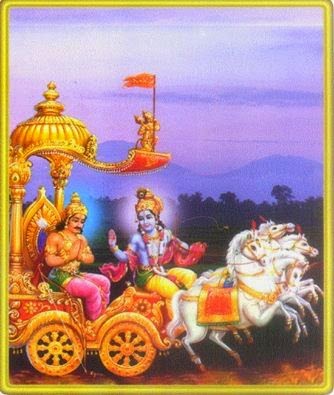Gita : Ch-3. Slo-29.
Srimad Bhagavad-Gita :
Chapter-3. ( Karma-yogam)
Slokam-29. ( Bewildered by the modes of material nature, the ignorant fully engage themselves in material activities and become attached. But the wise should not unsettle them, although these duties are inferior due to the performers' lack of knowledge. )
prakrter-guna-samudhah sajjante guna-karmasu,
tanakrtsnavido mandan krtsnavinna vicalayet.
prakrteh = of the nature's;
guna-samudhah = (who) do not have the knowledge of guna-s (of the nature), such fools;
guna karmasu = in the karma-s inaccordance with these guna-s (satvic, rajas, tamas);
sajjante = become engaged;
akrtsnavidah = (these) totally ignorant (persons of);
tan mandan = all these inactive lazy people;
krtsnavit = one who is jnani (knowledge-full person);
na vicalayet = do not disturb.
When Lord Krishna states that one should not disturb the minds, He is referring to the ignorant, all those who are still deluded by prakriti or the material nature and the three gunas or the modes of sattva or goodness, rajas or passion and tamas or nescience. One who is situated in the wisdom of Vedic knowledge should not unbalance the equilibrium of the ignorant who although attached to the results of actions are at least doing their daily duties.
The attributes of nature are those that are abducted by the senses thus delusion arises and the conception of false ego enjoying the sense objects impels a reaction. Lord Krishna uses the word guna-karmasu means the reactions from actions influenced by the modes of goodness, passion and nescience. Auditory and visual sense objects capture the attention of the senses being the ear and eye respectively and bring like or dislike to the mind. It should be understood that the impulses that come from the sense objects are secondary attributes and they have reactions and bind one to samsara the cycle of birth and death.
In this way after presenting the distictions between one who is spiritually wise in Vedic knowledge and those who are acting in ignorance; Lord Krishna gives the sober caution not to unsettle the minds of the ignorant, for they being completely infatuated by prakriti or material nature are totally attached to all their actions thinking always that they are performing a particular action for the express purpose of being able to enjoy a particular delight. They are unable to perform actions as a matter of duty without desiring rewards. So the spiritually wise should not deviate the ignorant from their duties even if these duties are completely fruitive without any spiritual benefit because at least they are performing actions and administering superior knowledge to them may cause them to refrain from their duties altogether. Eventually in the course of their lifetime there will be a glimmer of comprehension of the utter futility for attachment for such actions.
The misinformed make attempts for atma-tattva or soul realisation but due to their ignorance of the true nature of the atma or soul and because of their acute identification with the physical body and the senses they are obstructed in their attempts by the influences of the three gunas being the mode of goodness, passion and nescience. Such a person is quickly brought under the control of the gunas by their association with sense objects and cannot divert these natural tendencies towards atma-tattva. Thus they are not qualified for jnana yoga or the cultivation of knowledge but are only competent for karma yoga or performing prescribed Vedic activities.
The person situated in Vedic wisdom in jnana yoga after observing the meager capacities of the ignorant masses with their sluggish understanding should not attempt to convert them to jnana yoga from their easy to perform path of karma yoga. This is because it would be dangerous for the ignorant to give up the path of karma yoga to follow the path of jnana yoga when they are in no way qualified to do so. Leaving the path of karma yoga and unable to follow the path of jnana yoga they would having nothing and be at a loss in their lives. The conclusion is that one situated in Vedic wisdom and is a prominent leading figure in society should also perform prescribed Vedic activities in karma yoga even though such a person is a knower of atma-tattva. By acting in this way and performing Vedic activities without attachment lesser men will follow his example and perform in a like manner.
It has been shown earlier in this chapter that even for jnana yogis the path of karma yoga is preferable, hence persons of Vedic wisdom who are leaders in society should also tread the path of karma yoga as beacons of light for the masses in the world. The method of performing karma yoga by understanding that the atma is distinct from the physical body and thus ascribing the activities of the senses to be from the influences of the gunas has been thoroughly described.
One should contemplate and reflect on the atma and its essential nature which is purely spiritual. The atma performs no material activity but has association with actions through the gunas due to the conjunction with prakriti. Thus in association with prakriti there is doer ship with the atma and without association there is none. The next verse will explain the relationship between the senses and the gunas in regards to the Supreme Lord who is omniscient and omnipresent. Paramatma who is the Supreme Soul of all living entities evidenced by the fact that every individual soul constitutes His eternal, transcendental, spiritual body and are His eternal parts and parcels.
To be continued ...





Comments
Post a Comment